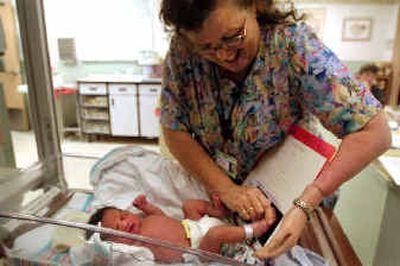Nurse overcame others’ blocks

It was Nathan Lee Zinnerman’s first bath.
His nurse, Susanne Fleming, held his head gently under the sink for a shampoo, and after changing his diapers, giving him his first shot and wiping his body, she wrapped him like a mummy in warmed blankets.
“They’ve got a personality already,” Fleming said, noting Nathan’s relative calm.
Fleming’s ease in her role was noticeable. Her silicone hand wasn’t.
Fleming was born without a left hand, but that didn’t stop her from pursuing a career in nursing, even after she was told she couldn’t.
Last week, the mother of four was presented with the 2004 Cherokee Inspired Comfort Award for her passion for the field and her advocacy for nurses who have disabilities. The prize comes with a cruise to the Cayman Islands, a crystal trophy and $1,000 worth of Cherokee health care uniforms.
“I’ve had patients comment on her ability to do things with one hand and make it look so effortless,” said Sandi Maddy, who works with Fleming at Deaconess Medical Center. “She’s a wonderful nurse, always in a good mood, always cheerful and helpful.”
Fleming first became passionate about nursing when she worked in her midteens as a nursing assistant at a care center for people with severe disabilities. But when Fleming first tried to enter nursing school in California in the mid-1970s, she was turned down. Officials there told her that she would endanger her patients and even expressed concern that she wouldn’t be able to give “bilateral back rubs,” Fleming said.
So she went to a different school, the Los Angeles County School of Nursing. There, she was elected president of her class, and she discovered that she could perform all the duties of a nurse. (While she can’t give a bilateral back rub, a rub with two hands, she has found that using one hand is just as effective.)
The only time she asks for assistance from another nurse is when catheterizing patients, a function she could perform on her own but prefers to do with help. It’s not something she often has to do, anyway.
Fleming says she tries to make herself available to other nurses who might need her help to lift patients or assist in other ways. It’s just part of being a team.
After school in Los Angeles, Fleming worked at a veterans hospital in Seattle and at medical centers in Hawaii, Texas and Germany when her husband was in the Army. Nine years ago, she and her family moved to Chewelah, where she still works at St. Joseph’s Hospital.
For the past year and a half, Fleming also has worked with moms and their newborns at the mother-baby unit at Deaconess Medical Center.
She earned her bachelor’s degree in nursing in May from Washington State University Intercollegiate College of Nursing, where an adviser persuaded her to become more vocal about nurses with disabilities. Fleming has since become a board member of ExceptionalNurse.com, which advocates for the inclusion of more people with disabilities in nursing.
Her disability sometimes helps her help patients. She has counseled mothers of newborns who have disabilities, and believes that she might better understand some patients because of the challenges she’s faced.
“Most patients are in a disabled condition,” Fleming said of hospital patients. “I hope I’m extra sensitive.”
Fleming is now pursuing her master’s degree in nursing from the University of Washington, completing most of her work online.
To get where she is now, Fleming said she had to dismiss the many depressing and pitiful images she saw in her childhood of people with disabilities. She remembers one particular time how she felt after seeing such a picture on TV.
“My mom came home from work and I asked her, ‘Am I a handicap?’ and she said, ‘Only if you want to be,’ ” Fleming said. “I felt relieved. It set me free.”
Despite her award, Fleming said the credit really belongs to the hospitals and schools that have welcomed her.
“I’m appreciative of all the people who allow me to work because it wasn’t like that 20 years ago,” Fleming said. “These are the people who are doing things. I’m just being myself.”